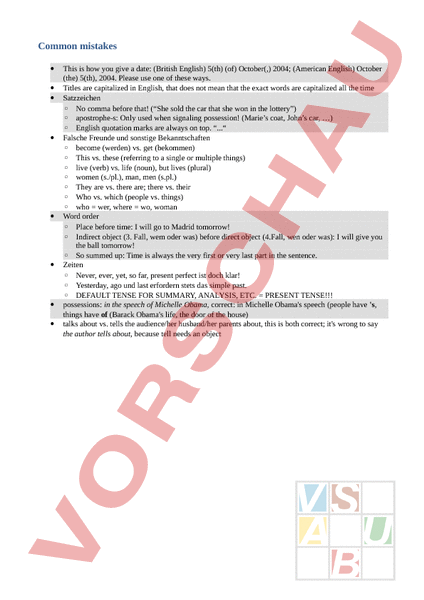Arbeitsblatt: Common Mistakes Sheet
Material-Details
Dieses Arbeitsblatt habe ich (jeweils angepasst an die Klasse) meinen Schülern nach einer Klausur ausgeteilt. Es umfasst die gängigsten Fehlerquellen und bietet Tipps zum verbessern
Englisch
Anderes Thema
11. Schuljahr
2 Seiten
Statistik
126448
946
2
11.01.2014
Autor/in
Sebastian Buch
Land: Deutschland
Registriert vor 2006
Textauszüge aus dem Inhalt:
Common mistakes • • • • • • • • This is how you give date: (British English) 5(th) (of) October(,) 2004; (American English) October (the) 5(th), 2004. Please use one of these ways. Titles are capitalized in English, that does not mean that the exact words are capitalized all the time Satzzeichen No comma before that! (She sold the car that she won in the lottery) apostrophe-s: Only used when signaling possession! (Maries coat, Johns car, ) English quotation marks are always on top. . Falsche Freunde und sonstige Bekanntschaften become (werden) vs. get (bekommen) This vs. these (referring to single or multiple things) live (verb) vs. life (noun), but lives (plural) women (s./pl.), man, men (s.pl.) They are vs. there are; there vs. their Who vs. which (people vs. things) who wer, where wo, woman Word order Place before time: will go to Madrid tomorrow! Indirect object (3. Fall, wem oder was) before direct object (4.Fall, wen oder was): will give you the ball tomorrow! So summed up: Time is always the very first or very last part in the sentence. Zeiten Never, ever, yet, so far, present perfect ist doch klar! Yesterday, ago und last erfordern stets das simple past. DEFAULT TENSE FOR SUMMARY, ANALYSIS, ETC. PRESENT TENSE!!! possessions: in the speech of Michelle Obama, correct: in Michelle Obama speech (people have , things have of (Barack Obama life, the door of the house) talks about vs. tells the audience/her husband/her parents about, this is both correct; it wrong to say the author tells about, because tell needs an object General criticism • • • • • • • Dont start sentence with ‘because or but specific- ‘the: think the rooftop gardening has future. think gardens are nice to look at. (General) think the gardens are nice to look at. (specific gardens, e.g. Alnwick gardens) There is no such thing as normal. Even if you put it into quotation marks the question of what is normal remains. Use less ‘things and ‘stuff. If you dont have anything precise to say, dont say it at all. They grow food and stuff like this is NOT precise. It the same for kind of Dont use it, it colloquial and imprecise! Summary No own opinion in summary! If you dont know what else to write, stop! If you copy parts it will cost you words, style and content points! Create distance to the content. The speaker/the author/the narrator says/states/emphasizes. If you dont start your sentences like this it is going to look like your stating your opinion or something that is generally believed to be true. The protagonist is killed on page 30 This is wrong! The protagonist is killed in the forrest! Same problem: In line 36 Michelle Obama talks about her husband No! At the National Democratic Convention she talks about her husband. This is how you should do it: Michelle Obama talks about her husband (l. 36) or When Michelle Obama talks about her husband (l. 36) Be precise: Earlier in time or In the past arent proper expressions to talk about historic events. What are you referring to? When did it happen? READ THE TASKS CAREFULLY AND FULFILL ALL ASPECTS OF THE TASKS!! Helpful Tools Translating: Writing: Studying: Grammar Ressources: Back part of your book, Konjugieren: Learning Games:
